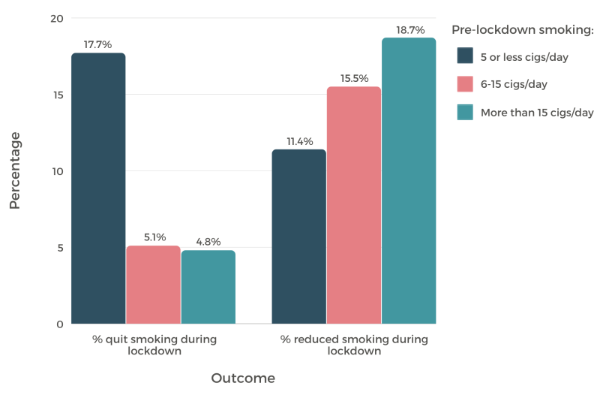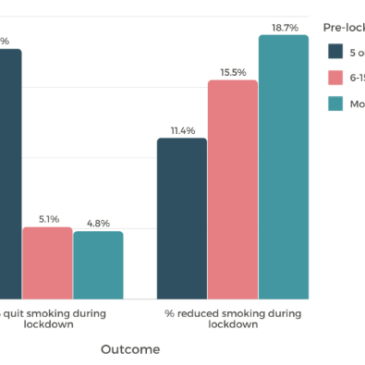Editor’s Note: Today’s review is part of our month-long Special Series on Managing Addiction during COVID-19. Throughout September, The BASIS is highlighting how the COVID-19 pandemic has impacted people managing addiction. This Special Series is generously sponsored by the Greater Boston Council on Alcoholism.
Italy was one of the first countries to experience high COVID-19 death tolls and, subsequently, one of the first countries to introduce stay-at-home policies. Worldwide quarantine restrictions changed the lives of many – particularly those who dealt with substance use disorders and other addictions. This week, ASHES reviews a study by Giulia Carreras and colleagues that investigated the impact of COVID-19 restrictions on the smoking consumption of Italian adults.
Author’s notes, Dr. Giulia Carreras: “Given our group’s long-term research experience in the field of smoking epidemiology, we were curious about the effects of the COVID-19 lockdown on the smoking habits of the Italian population. The restriction of social activity could have reduced smoking as a social habit. At the same time, the lockdown may have led to mental distress, such as increased monotony, anxiety and depression, with an increase of smoking habit as associated with mental illness.” (We thank Dr. Carreras for sharing personal thoughts about the article.)
What was the research question?
How did the implementation of a lockdown during the initial wave of COVID-19 impact smoking consumption of a representative sample of Italian adults?
What did the researchers do?
In March 2020, the Italian government imposed a national lockdown, restricting people’s movement except as necessary for work and health. Most of these restrictions were lifted in June 2020. In April and May of 2020, researchers administered the Lost in Italy survey to a representative sample of 6,003 Italian adults. The survey collected information on lifestyle habits, mental distress, and quality of life before and during the lockdown. Questions included a section on smoking habits (e.g., “Have you smoked at least 100 cigarettes in your entire life?”). The researchers measured participants’ mental health using validated instruments, with specific attention to how participants changed before and during lockdown to the time of the interview. They calculated prevalence estimates of all key outcomes and used odds ratios to see which factors influenced changes in smoking behaviors during the pandemic.
What did they find?
Smoking prevalence among Italian adults decreased during lockdown from 23.3% to 21.9%. However, among current Italian adult smokers (i.e., those who indicated on the survey that they currently smoke), the average number of cigarettes per day increased from 10.9 to 12.7.
Younger smokers had almost double the odds of quitting during the pandemic compared to older smokers. Quitting and cutting down on smoking was also associated with smoking intensity prior to lockdown, with light smokers (pre-lockdown) being more likely to quit but heavy smokers being more likely to cut down (see Figure). Former smokers were also more likely than those who had never smoked to begin smoking during lockdown. Lastly, among those who were current smokers before lockdown, a worsening mental health state was associated with increased consumption.

Figure. Percent of Italian adult smokers who quit or reduced smoking during the COVID-19 pandemic, based on the reported number of cigarettes smoked per day prior to lockdown. Prevalence rates for the “5 or less cigarettes smoked per day” group were significantly different from the “more than 15 cigarettes per day” group on both outcomes. Click image to enlarge.
Why do these findings matter?
The results show that current smokers (particularly those who were older and had worsening mental health states) were at greater risk of increasing their consumption during the lockdown. In order to continue to support Italian adults through the COVID-19 pandemic and beyond, it is important to understand what the risk factors are when determining an intervention plan. In particular, the pandemic has put a renewed focus on improving mental health and well-being. Given the important relationship between overall mental health and smoking outcomes, closing barriers and expanding access to mental health treatment through diverse mediums (in-person and telehealth) should be a major goal of this effort.
Every study has limitations. What are the limitations in this study?
This study was cross-sectional, so it’s unclear, for example, whether poor sleep quality caused increased smoking, or the other way around. Study participants might have also had trouble accurately recalling their smoking behaviors.
For more information:
SmokeFree offers tools and tips for quitting and maintaining abstinence from smoking tobacco. The Centers for Disease Control and Prevention also provides research and tips about cigarettes and how to quit. For more details about addiction, visit our Addiction Resources page.
— Karen Amichia & Timothy Edson, Ph.D.
What do you think? Please use the comment link below to provide feedback on this article.




